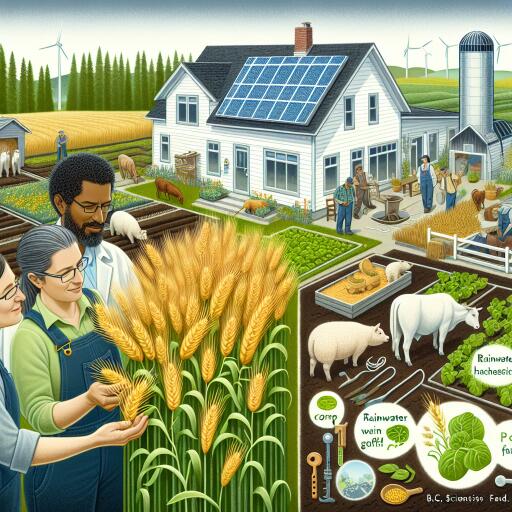
Sustainable farming does pay off, B.C. scientists find
Innovative research points to a pivotal shift in agriculture, indicating that embracing a multifaceted approach inclusive of varied plants, animals, and farming techniques not only sustains food productivity and increases farmer incomes but also dramatically diminishes detrimental environmental and climatic effects. This comes from a groundbreaking global study showcasing a promising path forward in agricultural practices at an increasingly critical juncture for environmental and social well-being.
Conventional agricultural practices have long leaned towards intensive farming systems. These prioritize high output through the use of significant chemical inputs and a focus on monocultures, a trend that has escalated since the inception of the so-called ‘Green Revolution’. Despite its contributions to food availability, this revolution has come with its share of environmental baggage, including escalated greenhouse gas emissions, decreased biodiversity, and unsustainable water usage.
The study, orchestrated by researchers from the University of British Columbia’s Biodiversity Research Centre among others, delves into the world of diverse farming by analyzing data from over 2,600 farms across four continents. It examines a spectrum of agricultural practices, from single-crop farming to intricate systems that integrate various crops and livestock, soil conservation methods, and natural pollinator attractions. The findings are illuminating, demonstrating significant benefits to biodiversity, food security, and farmer resilience in the face of climatic adversities.
Diversity in farming stands out as a beacon of resilience and ecological balance. Among the practices assessed, diversifying livestock and implementing soil conservation emerged as leading strategies, contributing extensively to a harmonious blend of human, animal, and environmental health. Unlike the pursuit of agricultural intensification, a strategy often devoid of these holistic gains, diversified farming presents a powerful alternative, promoting beneficial outcomes across the board.
The destructiveness of monoculture farming and over-reliance on industrial agriculture, particularly evident in North America’s historical trajectory, has led to significant ecological disruptions. The encroachment of single-crop systems, such as expansive blueberry farms in British Columbia, brings to light the issues of decreased habitat diversity and escalating pest-related challenges. This study emphasizes that fostering agricultural diversity not only mitigates such problems but also scales back the need for harmful pesticides, enhancing overall health and biodiversity.
Amid growing discourse on reducing meat consumption for environmental and health reasons, the research highlights the pivotal role that animals can play within diversified farming systems when managed sustainably. The notion isn’t to eliminate livestock but to encourage a balanced and interconnected agricultural model where animal husbandry and crop farming support and enrich one another, avoiding the pitfalls of spatial and functional separation prevalent in current practices.
The implications of this study are profound, especially in a world grappling with the need to redefine agricultural paradigms. Transitioning towards more diversified, sustainable farming practices is not just a matter of ecological responsibility but also a viable pathway to ensuring food security and farmer livelihoods in the face of growing environmental challenges. However, this transition entails overcoming significant barriers, from policy and market constraints to the inertia bound in conventional farming methodologies.
The call to action is clear: nurturing biodiversity, sustaining natural resources, and enhancing agricultural resilience through diversified practices is imperative. This requires a concerted effort from policymakers, farmers, and the global community to realign incentives, invest in supportive infrastructure, and foster innovations that bridge traditional wisdom with modern agricultural needs. By doing so, we step closer to a future where agriculture nourishes not only humanity but the very world that sustains it.





Leave a Reply